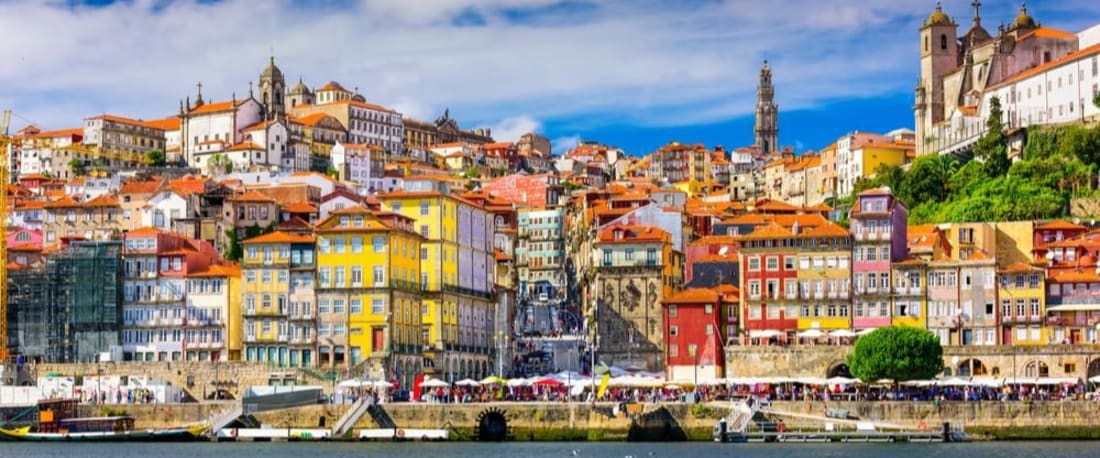Study Master in Portugal 2024
Study in Portugal
The territory of Portugal includes an area in the Iberian Peninsula (referred to as the continent by most Portuguese) and two archipelagos in the Atlantic Ocean: the archipelagos of Madeira and the Azores. Mainland Portugal is split by its main river, the Tagus which flows from Spain and disgorges in Tagus Estuary, in Lisbon, before escaping into the Atlantic. The northern landscape is mountainous towards the interior with several plateaus indented by river valleys, whereas the south, which includes the Algarve and the Alentejo regions, is characterized by rolling plains.
Portugal is a Republic in southwestern Europe adjacent to the Iberian Peninsula and bordered by Spain to the east and north and the Atlantic Ocean to the south and west. Portugal holds sovereignty over the Madeira and Azores archipelagos and is named after Porto, the country's second-largest city. A member of the European Union and listed high on the HDI, or Human Development Index, Portugal is a peaceful, globalized nation that also belongs to the United Nations, the Latin Union, NATO, and the Organization of Ibero - American States.
Following the approval of its current constitution in 1976, Portugal has been operating as a democratic republic with Lisbon as its capital and largest city. The Assembly of the Republic, the President of the Republic, the Government and the Prime Minister are Portugal's four primary governmental institutions. Similar to the U.S. and Europe, Portugal has several political parties from which citizens choose candidates and elect. The two dominant parties are the Social Democratic Party and the Socialist Party, with the Ecologist Party and the Portuguese Communist Party regularly garnering about ten percent of the vote during each election.
Essential Facts about Portugal
- Portugal opened the largest solar energy factory in the world in 2006, in the city of Alentejo.
- Besides Portugal and Brazil, Portuguese is also spoken in Equatorial Guinea, Angola, Mozambique, and Cape Verde.
- Students choosing to earn a degree in Portugal will want to see the longest bridge existing in Europe--the Vasco de Gama Bridge--that spans nearly 11 miles, or 17.3 kilometers and crosses the Tagus River near Lisbon.
- Bullfighting remains legal in Portugal.
- Portugal is home to nearly 11 million people, with one-third of its population living in Lisbon and Porto.
- Coimbra, Portugal is home to one of Europe's oldest universities, the University of Coimbra, which was established in 1290 A.D.The Portuguese eat more fish than any other people in the world.
Portugal's Climate
Portugal offers Mediterranean, Steppe, and semi-arid climates and presents some of the warmest temperatures in Europe. Visitors to the Guadiana basin near Spain's border may swelter under summertime temperatures reaching as high as 100 degrees Fahrenheit (38 Celsius). However, snow falls regularly between October and May in Portugal's northern and central regions, with winter temperatures averaging 25 degrees Fahrenheit, or -9 Celsius.
Portugal's Currency
Being a member of the European Union, Portugal's main currency is the euro and its Banco de Portugal represents a significant component of the ESCB ( European System of Central Banks ). The majority of Portugal's financial and business organizations are based in Porto and Lisbon's metropolitan areas.
Change currency
Basic monthly living cost
Rent in a shared flat
429Share of utilities
35Internet subscription
35Local transportation
40
Sample lifestyle cost
Fast food combo
7Cinema ticket
7Pint of local beer
2
About Portugal
Higher Education in Portugal
Portugal offers polytechnic and university-type education that is provided by private or public universities, university institutes or polytechnic institutes. Universities operated by the government admit students via a competitive system called numerus clausus, or"enrollment restrictions"". Students must pass exams that test them in specific subjects and receive minimum grades before they are legally allowed to apply to universities. Admission criteria for many undergraduate and graduate degree programs taught in public universities are generally more demanding and selective than criteria expected by polytechnics or private universities.
The Portuguese higher education system is exceptionally research-oriented but polytechnics offer students the chance to earn degrees in professional fields such as psychology, law, economics, medicine and the natural sciences. Degrees encompassing educational, technological, engineering and liberal arts careers are provided by both polytechnic institutions and universities. All private and public higher education facilities cannot operate unless they have been recognized by Portugal's Ministé rio da Ciência, Tecnologia e Ensino Superior (Ministry of Science, Technology and Higher Education).
International students wishing to attend a Portuguese university will need the equivalent of a Diploma de Ensino Secundári, which is similar to a U.S. high school diploma, as well as documentation indicating entrance exam test scores. Because Portugal is part of the European Union and adheres to the Bologna Process, students receive bachelor's (licenciatura), master's (mestrado), and doctorate (Doutoramento) degrees that are comparable to those given in the U.S. and most of Europe.
Student Visa Requirements
European Union students do not need a visa to study in Portugal, although EU students may need to show they can support themselves before they are allowed to begin coursework at a Portuguese university. Alternatively, non-EU students will have to obtain a student visa if they plan to remain in Portugal for more than three months. Paperwork necessary for starting the visa application process includes a valid passport; completed application; one passport photograph; university acceptance letter; copy of a travel itinerary and airplane ticket; proof of health insurance and bank statements or other proof of the student's financial status.
Higher education is not free in Portugal but scholarships and other financial aid may be available to eligible students. The average cost of yearly tuition fees for bachelor's and master's degree programs is approximately $1300 to $1800 U.S. dollars or 950 to 1300 euros. Doctorate degrees cost significantly higher.
Why Study in Portugal?
With Portugal's higher education system increasing its focus on technology and research in the fields of space, biotechnology, and renewable resources, students who are interested in pursuing careers in these industries will find that Portuguese universities have more to offer than many other institutions. In addition, Portugal's countryside is geographically and climatically diverse, offering picturesque mountains, lovely pastures, and miles of coastline for students to experience and explore.
Visa Requirements
- Transit and short-term Schengen stay visa (type C) – for students who apply to a short study or language course that lasts a maximum of 3 months.
- Schengen National 'Long-stay' visa (type D) – for students who apply for an academic study degree.
- Portuguese residence permit for researchers - for non-EU nationals coming to Portugal to engage in post-doctoral research activities for longer than 3 months.
What type of Visa do you need?
Visa name
C type visa; D type visa; Portuguese residence permit for researchers
Price and currency
EUR 170
The Portuguese student visa processing fee is around 170 EUR. The fee may be subject to change.
Who can apply for the visa?
Students from EU/EEA countries do not need a visa to study in Portugal but should apply for a residence card on arrival (Autorização de Residência). This must happen within the first three months of arrival and can be done at the local council building.
Non-EU/EEA students wanting to study in Portugal will require a student visa and a residence permit. Visas must be obtained before traveling. Residence permits are applied for on arrival from the Portuguese Immigration and Borders Service (SEF).
Residents of some non-EU countries will not require a visa for short stays of less than three months and can enter Portugal freely with only a valid passport. There are more than 30 countries for whom this applies including the US, Canada, Australia, and New Zealand.
Where can you make the application?
Portuguese embassy or consulate
You will need to apply for a Portuguese study visa with the Portuguese embassy or consulate in your home country.
How to make the application?
You can start the visa application process once you have received a university acceptance letter. The process is conducted at the Portuguese embassy or consulate in your home country - you will need to schedule a visa interview on their website, where you can also check the required documentation.
The documentation that you need for your visa application might entail the following:
- Your completed application form (downloaded from the website of your local Portuguese consulate)
- Two passport-sized photographs
- A passport that expires no sooner than three months after you return home
- A letter of acceptance from the educational institution that you plan to attend in Portugal
- Proof that you have the financial resources to support yourself during your stay
- Proof that you have purchased health insurance
- A purchased ticket to travel to Portugal
- Proof that you have made arrangements for accommodation once you arrive in Portugal
Some embassies/consulates may also request a criminal record certificate.
When should you apply?
After submitting your Portuguese student visa application, the approval process can take anywhere between one and three months to process, depending on which country you are applying from.
The length of your student visa depends on the length of your study program. All international students will need to apply for a residence permit within three months of arriving in Portugal, which will then be valid for one year. After a year, residence permits can be renewed for up to five years.
Processing time
3 Months
Work opportunities
EU/EEA students are allowed to work in Portugal without any restrictions or time limits.
Students from outside the EU/EEA can work up to 20 hours/week or full-time during vacations.
Hours per week
20
Why do you need this type of visa?
Your visa application may be rejected if you are not able to show proof of the required funds, or if you provide incorrect or incomplete documents.
Institutions
- Arqus European University Alliance
- QA Team Test School 1402
- NOVA IMS - Information Management School
- Católica Lisbon School of Business and Economics
- Nova Medical School
- Universidade Católica Portuguesa
- EC2U
- NOVA School of Law
- Egas Moniz School of Health & Science
- University of Lisbon - Instituto Superior Técnico


